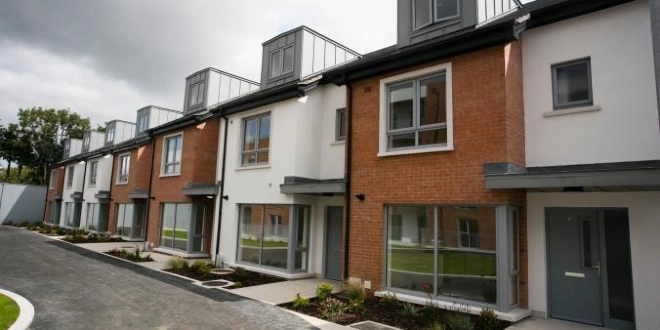Dublin City Council (DCC) has confirmed it is working closely with the Department of Housing, the Land Development Agency (LDA), and Approved Housing Bodies (AHBs) to speed up the delivery of homes for first-time buyers and households on the social housing list.
Mick Mulhern, Assistant CEO for Housing at DCC, said the council is coordinating activity across more than 100 development sites with the goal of producing 12,000 homes. “We’re working to deliver as many homes as possible in the quickest timeframe possible,” he explained, while noting that completion of the projects will stretch over several years.
As part of the newest wave of housing delivery, 169 homes were unveiled this week at Rathbourne Crossing, near Ashtown station. Of these, 86 will be taken by DCC, including a mix of one- and two-bedroom social housing units. The development will also feature a new childcare facility and shared amenity space.
Property Prices Show Slowing Growth
The push for more homes comes against the backdrop of cooling property price growth. The Central Statistics Office (CSO) reported that annual residential property inflation eased to 7.5% in July, the lowest rate in 16 months. By comparison, prices had risen 7.9% in June.
In Dublin, property values were up 6% year-on-year, while prices outside the capital increased by 8.7%. Regional variation remains significant: the Midlands recorded the strongest annual growth at 10.9%, while Dún Laoghaire-Rathdown had the lowest increase in Dublin at 4.7%. The median home price nationwide in the year to July was €374,999, with the highest at €675,000 in Dún Laoghaire-Rathdown and the lowest at €195,000 in Donegal and Leitrim.
Council and Government Acknowledge Challenges
Lord Mayor of Dublin Ray McAdam highlighted the significant pipeline of housing projects underway but conceded that more urgency is needed. “Obviously I fully acknowledge that we need to do more, and we are doing more,” he said. The council will review later this year how priority is determined on its housing waiting list, with the Strategic Housing Policy Committee examining possible changes.
McAdam also addressed homelessness, acknowledging the number of families in temporary accommodation remains too high. “What we’re working to do is to ramp up supply, so those families have the opportunity to move into permanent housing,” he said.
Minister Browne Stresses Supply as Key
Minister for Housing James Browne echoed the importance of ramping up construction. He described stabilising affordability as a matter of increasing supply, stating: “We need to get the apartments and the homes built. People need to be able to afford them.”
While emphasising progress, Browne acknowledged that housing delivery has not yet reached the pace required. More than 30,000 homes were completed last year, short of expectations, and he admitted this year’s targets are starting from “further behind.” However, he stressed that the government had exceeded previous benchmarks under the Housing for All plan and remains committed to accelerating delivery.
Browne also pointed to measures being introduced, such as extending rent pressure zones nationwide, strengthening tenant protections, and attracting international investment to keep construction financing flowing. “We accept there has to be a significant step change,” he said.
New Housing Activation Office
The government is also launching a new Housing Activation Office, designed to coordinate delivery by linking local authorities and utility companies. Browne said the office will not appoint a “housing tsar” but will have a lead official to oversee operations. “This is about ensuring that we have the homes delivered where they are needed, in communities that everyone deserves,” he explained.
Market Trends and Transactions
The CSO figures underline both the rising costs and strong demand in Ireland’s housing market. In July, 4,712 home purchases were recorded with Revenue, slightly down from the same month last year. The total transaction value reached €2.1 billion, with €1.5 billion in existing homes and €550.7 million in new builds.
Property prices are now 6.8% higher in Dublin than at their 2007 peak, while outside the capital, they sit 23% above the pre-crash high of May 2007.
Outlook
While both DCC and the government highlight progress in housing delivery, the scale of demand continues to outstrip supply. Efforts to address homelessness, attract investment, and streamline planning remain central to long-term solutions. With more than 12,000 homes in Dublin’s pipeline and national strategies under review, officials stress that the coming years will be critical in determining whether affordability and availability can be brought back under control.
 The Daily Star Ireland
The Daily Star Ireland



